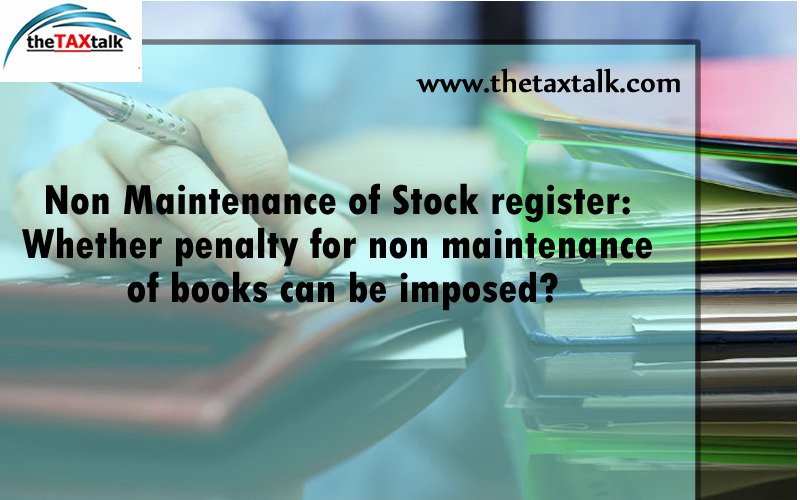![]()
Non Maintenance of Stock register: Whether penalty for non maintenance of books can be imposed?
There is Penalty under s. 271A for failure to maintain books of account.Question arises whether Non-maintenance of stock register would attract penalty?
It may be noted that Provisions of r. 6F have not been made applicable to persons carrying on a business or profession other than those mentioned under s. 44AA(1) and covered under s. 44AA(2). Therefore, r. 6F may not be applicable to all the assessee.
In normal course, assessee is required to keep and maintain the books of account in such a manner so as to enable the AO to determine his total income in accordance with the provisions of the Act .
If assessee had maintained cash book and ledger, purchase and sale vouchers then it can be said that the books of account and documents as envisaged in section 44AA(2) have been complied with and penalty under s. 271A is not leviable upon the assessee for non-maintenance of stock register
ITAT in the case of Sujan Singh vs. AO has observed as under:
1. Sub-s. (1) of s. 44AA provides that every person carrying on legal, medical, engineering and architectural profession or profession of accountancy or technical consultancy or interior decoration or any other profession as is notified by the Board shall keep and maintain such books of account and other documents which may enable the AO to compute his total income in accordance with the provisions of the Act. This section is applicable only to persons carrying on the specific professions mentioned therein. Sub-s. (2) of s. 44AA stipulates that every person carrying on a business or profession other than those mentioned under s. 44AA(1) is required to keep and maintain books of account, if his income from business or profession exceeds Rs. 1,20,000 or his total sales, turnover or gross receipts exceed or exceeds Rs. 10,00,000 in any one of the three years immediately preceding the previous year. The provisions of r. 6F have not been made applicable to persons carrying on a business or profession other than those mentioned under s. 44AA(1) and covered under s. 44AA(2). The case of the assessee falls under sub-s. (2) of s. 44AA, as the assessee was carrying on the business of a poultry farm. The Board has not specified or notified the books of account to be maintained by persons covered under sub-s. (2) of s. 44AA. Therefore, r. 6F is not applicable to the case of the assessee.—ITO vs. Dinesh Paper Mart (1999) 64 TTJ (Nag) 674 : (1999) 70 ITD 274 (Nag) relied on.
2. Even though the provisions of r. 6F are not applicable to the assessee, yet it does not mean that the assessee was not required to maintain any books of account. The assessee was still required to keep and maintain the books of account in such a manner so as to enable the AO to determine his total income in accordance with the provisions of the Act, because the turnover of the assessee exceeded Rs. 10,00,000. The assessee had maintained cash book and ledger. All purchase vouchers were also maintained. This fact is admitted by the AO in the assessment order. The AO, vide his remand report submitted before the CIT(A), admitted that the purchase and sale vouchers were maintained and examined. Thus, the only lapse on the part of the assessee was non-maintenance and non-production of stock register and stock inventory. The AO has himself admitted that the return of income filed was accompanied by audit report and other documents. The books of account and documents to be kept and maintained by persons covered under s. 44AA(2) have not been specified under the Act or the Rules. Thus, when the law did not prescribe the type of books of account to be maintained by the assessee and the assessee had indeed maintained the books of account, the assessee cannot be penalised for the default which he has not committed. It must be mentioned that provisions of the taxation laws in general and those relating to penalty specifically require to be interpreted by applying the strict rule of interpretation. Nothing can be added to or subtracted from the plain provisions of the sections of the Act. The law does not prescribe the specific books of account which were required to be maintained. Therefore, no penalty under s. 271A was leviable.
In short, Provisions of r. 6F are not applicable to persons carrying on a business or profession other than those mentioned under s. 44AA(1) and covered under s. 44AA(2); books of account and documents to be kept and maintained by persons covered under s. 44AA(2) have not been specified under the Act or the Rules and therefore assessee maintaining cash book, ledger, purchase and sales vouchers is not liable for penalty under s. 271A for non-maintenance of stock register.

